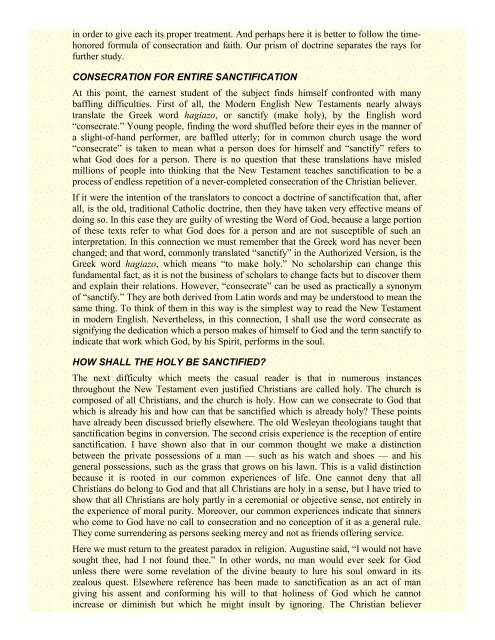2. The Meaning of Sanctification - Enter His Rest
2. The Meaning of Sanctification - Enter His Rest
2. The Meaning of Sanctification - Enter His Rest
Create successful ePaper yourself
Turn your PDF publications into a flip-book with our unique Google optimized e-Paper software.
in order to give each its proper treatment. And perhaps here it is better to follow the timehonored<br />
formula <strong>of</strong> consecration and faith. Our prism <strong>of</strong> doctrine separates the rays for<br />
further study.<br />
CONSECRATION FOR ENTIRE SANCTIFICATION<br />
At this point, the earnest student <strong>of</strong> the subject finds himself confronted with many<br />
baffling difficulties. First <strong>of</strong> all, the Modern English New Testaments nearly always<br />
translate the Greek word hagiazo, or sanctify (make holy), by the English word<br />
“consecrate.” Young people, finding the word shuffled before their eyes in the manner <strong>of</strong><br />
a slight-<strong>of</strong>-hand performer, are baffled utterly; for in common church usage the word<br />
“consecrate” is taken to mean what a person does for himself and “sanctify” refers to<br />
what God does for a person. <strong>The</strong>re is no question that these translations have misled<br />
millions <strong>of</strong> people into thinking that the New Testament teaches sanctification to be a<br />
process <strong>of</strong> endless repetition <strong>of</strong> a never-completed consecration <strong>of</strong> the Christian believer.<br />
If it were the intention <strong>of</strong> the translators to concoct a doctrine <strong>of</strong> sanctification that, after<br />
all, is the old, traditional Catholic doctrine, then they have taken very effective means <strong>of</strong><br />
doing so. In this case they are guilty <strong>of</strong> wresting the Word <strong>of</strong> God, because a large portion<br />
<strong>of</strong> these texts refer to what God does for a person and are not susceptible <strong>of</strong> such an<br />
interpretation. In this connection we must remember that the Greek word has never been<br />
changed; and that word, commonly translated “sanctify” in the Authorized Version, is the<br />
Greek word hagiazo, which means “to make holy.” No scholarship can change this<br />
fundamental fact, as it is not the business <strong>of</strong> scholars to change facts but to discover them<br />
and explain their relations. However, “consecrate” can be used as practically a synonym<br />
<strong>of</strong> “sanctify.” <strong>The</strong>y are both derived from Latin words and may be understood to mean the<br />
same thing. To think <strong>of</strong> them in this way is the simplest way to read the New Testament<br />
in modern English. Nevertheless, in this connection, I shall use the word consecrate as<br />
signifying the dedication which a person makes <strong>of</strong> himself to God and the term sanctify to<br />
indicate that work which God, by his Spirit, performs in the soul.<br />
HOW SHALL THE HOLY BE SANCTIFIED?<br />
<strong>The</strong> next difficulty which meets the casual reader is that in numerous instances<br />
throughout the New Testament even justified Christians are called holy. <strong>The</strong> church is<br />
composed <strong>of</strong> all Christians, and the church is holy. How can we consecrate to God that<br />
which is already his and how can that be sanctified which is already holy? <strong>The</strong>se points<br />
have already been discussed briefly elsewhere. <strong>The</strong> old Wesleyan theologians taught that<br />
sanctification begins in conversion. <strong>The</strong> second crisis experience is the reception <strong>of</strong> entire<br />
sanctification. I have shown also that in our common thought we make a distinction<br />
between the private possessions <strong>of</strong> a man — such as his watch and shoes — and his<br />
general possessions, such as the grass that grows on his lawn. This is a valid distinction<br />
because it is rooted in our common experiences <strong>of</strong> life. One cannot deny that all<br />
Christians do belong to God and that all Christians are holy in a sense, but I have tried to<br />
show that all Christians are holy partly in a ceremonial or objective sense, not entirely in<br />
the experience <strong>of</strong> moral purity. Moreover, our common experiences indicate that sinners<br />
who come to God have no call to consecration and no conception <strong>of</strong> it as a general rule.<br />
<strong>The</strong>y come surrendering as persons seeking mercy and not as friends <strong>of</strong>fering service.<br />
Here we must return to the greatest paradox in religion. Augustine said, “I would not have<br />
sought thee, had I not found thee.” In other words, no man would ever seek for God<br />
unless there were some revelation <strong>of</strong> the divine beauty to lure his soul onward in its<br />
zealous quest. Elsewhere reference has been made to sanctification as an act <strong>of</strong> man<br />
giving his assent and conforming his will to that holiness <strong>of</strong> God which he cannot<br />
increase or diminish but which he might insult by ignoring. <strong>The</strong> Christian believer









